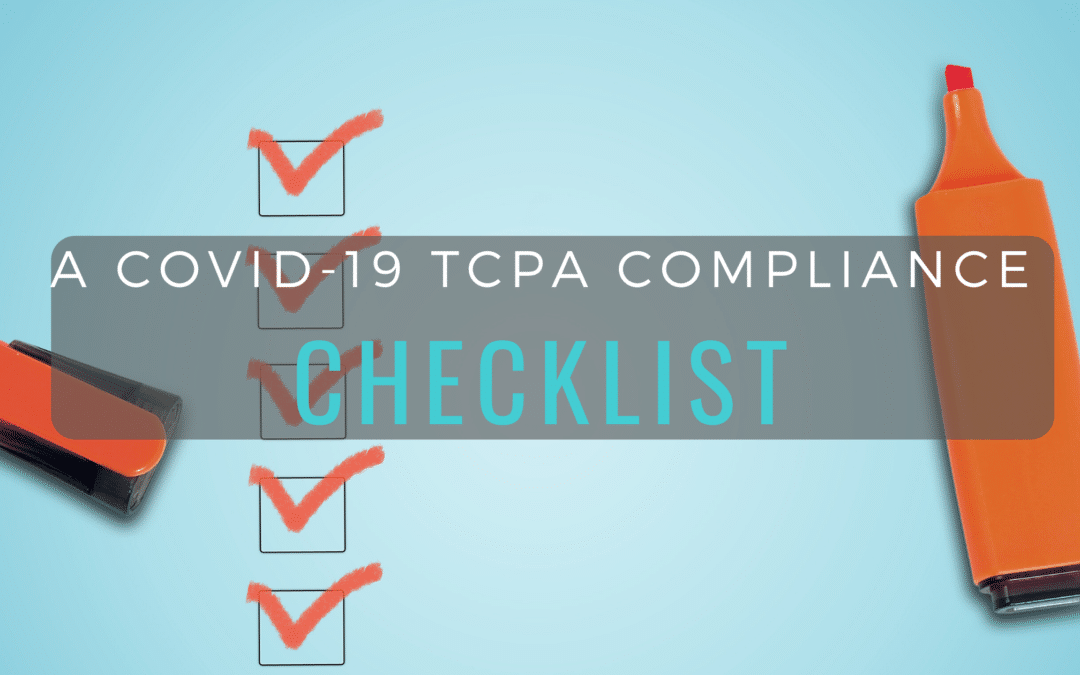COVID-19 has changed everything – including your call strategy and your TCPA compliance checklist.
A TCPA compliance checklist is always a good idea if you make business calls, but it’s exceptionally smart during a pandemic. As much as using a TCPA compliance checklist would seem obviously helpful, too few outbound sales organizations and departments have one. Those that do tend to let them gather dust in some forgotten corner. And lest you forget, compliance is one of the most critical components of keeping your doors open.
A checklist is a simple, straightforward way to remember and follow operating procedures. It takes away the pressure of trying to remember all those little details. More than that, though, a TCPA compliance checklist can help you if you do run afoul of regulations. We all make mistakes, but the FCC is a lot more likely to cut you some slack if you have a written checklist and protocols that you follow.
Here’s the catch, though. Even if you do follow a TCPA compliance checklist, COVID-19 has changed some of the rules. This isn’t just nationally, either. Some states have new rules in effect that temporarily prohibit some types of calls, such as collections calls.
On the other hand, certain compliance regulations are suspended, and calls to numbers on the Do Not Call list are acceptable for emergency-related, informational calls. Before you start making calls, though, there are some strict parameters around this. For instance, the call needs to be from a hospital or health care provider.
Of course, even under the best of circumstances, you want to pay close attention to compliance. You’ve read on this blog and undoubtedly many other places about the high fines in place for companies who don’t follow compliance regulations. As an example, within the past several years, companies like Dish Network and AT&T have faced tens of millions of dollars in fines.
Which brings us to the checklist. What needs to be on yours? Assuming you are making sales calls and do not fall into the exceptions for emergency information, here’s where to begin.
Use TCPA-compliant software like Call Logic so you can stop worrying and start focusing on your business. Schedule a free demo right now to find out more!
The TCPA compliance checklist that you need to follow
First things first, always check and follow the most current state laws. For instance, the state of New York prohibits telemarketing during a declared state of emergency unless you already have consent or a valid business relationship.
In Nevada, non-essential businesses had to close when the pandemic hit, and it was recommended that debt collectors cease operations. And New Jersey’s “stay at home” order mandated that companies make accommodations for people to work from home. If you are making business calls from home, that could require a vast array of security and privacy updates, depending on the field you are working in. So again, check the local laws before you print out your TCPA compliance checklist.
Even before COVID-19, the state of Maine had some unique restrictions in place. “A person may not use an automated telephone calling device to make solicitation calls to any telephone number in the State except weekdays between 9 a.m. and 5 p.m., according to the time in this State, and may not complete more than one solicitation call to any telephone number during each 8-hour period.”
That said, you’ll recognize many of the points on this list. But there are a few surprises.
- Create your Do Not Call Registry profile and get your Subscription Account Number.
- Document your compliance process.
- Define and document your training process. (This is helpful if you need to verify that you train your call staff.)
- Keep an updated list of numbers on the Do Not Call Registry.
- Keep a DNC list for your business. Call recipients can request to be on your Do Not Call list even if they aren’t on the national DNC registry.
- Only call numbers for which you have consent to call. (This could be through previous business interactions or if the person you call initiated contact, for example, but the more you can document, the better.)
- Disconnect the call if no one answers withing 15 seconds or after four rings, whichever comes first.
- Always state your name, the name of the company, and provide a number where you can be reached.
- Offer an opt-out. This is true for both voice calls and calls when you need to leave a message.
- Do not make calls before 8 a.m. or after 9 p.m. local time.
- Do not engage in deceptive sales tactics.
- Scrub your DNC list at least once per month (or use Call Logic, and the software does instantly every time you make a call).
- Maintain a call abandonment rate of less than 3%. A call is considered abandoned if a live operator does not respond to within two seconds of the recipient’s completed greeting. (Again, not an issue with Call Logic’s delay-free software.)
In addition to these items, some other considerations belong on your TCPA compliance checklist, even though the TCPA doesn’t necessarily cover them. COVID-19 has brought about unbelievable changes in the way we function. Many people are facing questions about the future of their financial situations. They wonder what school or college will be like for their kids. They’ve changed the way they work, and some may be out of work altogether.
All of this requires a certain amount of care and sensitivity on the part of your sales team. Enough tone-deaf calls could ruin the reputation of your organization. So bear in mind the circumstances people may be in as you determine your call strategy moving forward. Since the entire world, including your phone sales team, has been subject to coronavirus lockdowns and changes, it should be easy to empathize with the people you are calling.
Stay in compliance with software that knows the rules. Check out a free demo right now to see how our system helps keep you out of trouble.
Please note that this post is for informational purposes only, and should not be considered as professional legal advice.

